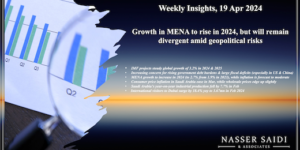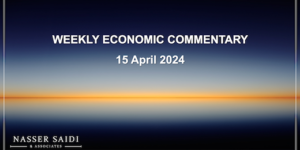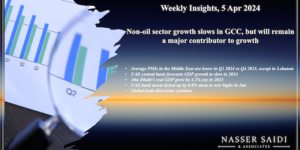Markets
Global equity markets were in a positive mood till China’s move to restrain credit growth rattled markets on Friday. The sentiment was reflected in the regional markets where most stock market indices closed in the green. The dollar-index hit a 7-month high on Friday while the euro dropped to a 9 month low due to Greece’s fiscal woes. Oil got support from a forecast by the International Energy Agency, over oil demand to average 86.50 million bpd in 2010, while gold was attractive given volatile currency markets.
Global Developments
America:
• Ben Bernanke laid out the Fed’s vision for withdrawing liquidity from the financial system last Wednesday; while he did not reveal a timeline for policy change, he did propose the likely sequence. Fed would initially use “reverse repo”, under which it sells assets for cash with an agreement to buy them back, and a “term deposit facility”, a kind of certificate of deposit for banks.
• Initial jobless claims fell by 43k to 440k in week ended Feb 6; a Labor Department spokesperson claimed that the backlog of accumulated applications was cleared. Retail sales posted solid gains in Jan, at 0.5% mom, but sales ex-autos rose less than market expectations.
Europe:
• France and Italy industrial production declined in Dec and this was later reflected in the Eurozone IP, at -0.5% mom.
• Q4 provisional GDP data showed French growth was up 0.6% qoq, while Germany registered flat qoq growth and Italian GDP was below expectations at -0.2% qoq; overall Eurozone GDP was up 0.1% qoq. The “only positive contribution” to Q4 growth in Germany was foreign trade while consumer spending and investment fell compared with Q3.
• Greece’s fiscal problems and need for a ‘bail-out” have weakened the euro and lowered the market’s credit risk assessment of Portugal, Ireland & Spain that face similar problems.
Asia and Pacific:
• In another surprise market move, China raised the legal reserve requirements for commercial banks by 50bps on Friday in an effort to control rapid lending rather than significantly tighten monetary policy.
• Chinese Jan CPI inflation was +1.5% yoy, down from +1.9% in Dec; M2 growth fell to 26.0% while M1 growth hit an all time high of 39.0% (likely due to the Lunar New Year effect – as demand for liquidity rises before the holiday season).
• China’s Jan trade registered 21% yoy export growth alongside 85.5%, taking the trade surplus to USD 14.2bn. Compared to Dec’s strong growth, Jan data seem to be relatively dim, possibly due to some distortion due to the Lunar New Year effects.
• Japan’s machinery orders for Dec came in at +20.1% mom versus the market expectation of +8.0%. Orders from manufacturers show high growth for export sectors (chemicals) but non-manufacturers (finance & insurance) were down due to weak domestic demand.
• Indonesia Q4 GDP growth was 5.4% yoy, as public consumption and investment surged while private consumption eased moderately.
Bottom line: The recovery in Europe has already lost steam and is marred by a fiscal crisis in the Mediterranean countries. The US seems in better shape for now, while Asia and China in particular is steadily going back on a path of expansion.
Regional Developments
• The GCC Monetary Council will appoint its Chief in March. Additionally, the Gulf Arab central bank governors are expected to hold the first meeting of their joint monetary council on March 30, the next step towards monetary union.
• Oman has no plans to issue government bonds this year and banks remain liquid despite the impact of the global financial crisis, according to the Central Bank of Oman. In a similar announcement, Qatar’s Central Bank governor said that Qatar does not see the need to provide more bank support after it spent $900 mn on buying bank stakes amid the financial crisis to bolster the sector.
• Omani money supply grew 4.7% yoy at the end of Dec09 from 4.5% growth in Nov09.
• Kuwait’s central bank surprised markets with a 50ps cut in its discount rate to 2.5% and in two of its repo rates by 25bps: 1-wk repo rate to 1.5% and its 1m rate to 2%. The move aims to boost banks lending and lure the private sector into a 4-year development plan.
• Kuwait has forecast a deficit of KWD 7.41bn in its 2010/11 budget, with oil forecast at $43/barrel. Expenditure covers part of the KWD 30bn four years’ development plan which was passed by parliament earlier this month.
Market Intelligence on the UAE
• The yield on Dubai’s latest Islamic bonds, issued in October at 6.5%, climbed last week as high as 9%, traders in Dubai said. The cost of insuring Dubai’s bonds, which had fallen after Abu Dhabi rescue, has climbed back above $500 for every $10,000 of debt.
• Dubai government injected $6.2 bn into Dubai World and it is prepared to put even more money into the conglomerate. According to an anonymous spokeswoman the money is provided on a commercial basis through the Dubai Financial Support Fund.
• UAE’s growth will remain “low” in 2010, but higher than in 2009, Central Bank Governor Sultan Bin Nasser Al Suwaidi said.
• Inflation fell substantially in 2009 to a nine year low of 1.5%, as per data released by the National Bureau of Statistics.
• Dubai government announced a plan to set up a trade regulator —Joint Commercial Control and Protection Establishment – to develop and protect the business environment and protect individuals and companies from illegal commercial practices.
• Damac has filed a motion to stop an investor’s lawsuit being heard in the DIFC. The suit claims breaches of contracts, misrepresentation of properties, fraud and improper use of funds and is a test case for the legal environment in Dubai.
• At its five-month anniversary the Dubai Metro, hit the ten million passenger mark, as per data released by the RTA.
Weekly Economic Commentary – February 14, 2010
14 February, 2010
read 4 minutes
Read Next
publication
Weekly Insights 19 Apr 2024: Growth in MENA to rise in 2024, but will remain divergent amid geopolitical risks
IMF forecasts (growth, inflation, debt). Saudi inflation, IP. Dubai tourism. Download a PDF copy of
19 April, 2024
publication
Weekly Economic Commentary – Apr 15, 2024
Download a PDF copy of the weekly economic commentary here. Markets Major equity
15 April, 2024
publication
Weekly Insights 5 Apr 2024: Non-oil sector growth slows in GCC, but will remain a major contributor to growth
Middle East PMIs. UAE GDP inflation. Abu Dhabi GDP. UAE monetary stats. Global trade diversion.
5 April, 2024





